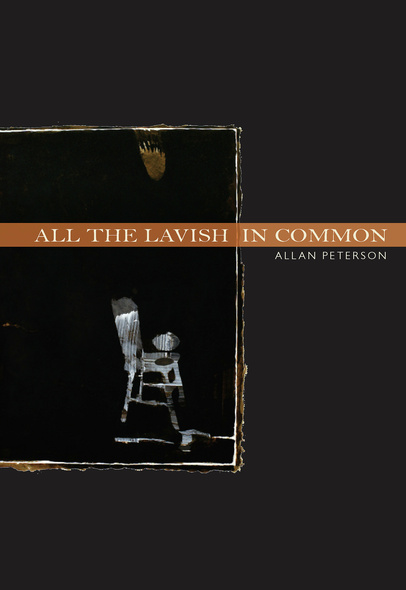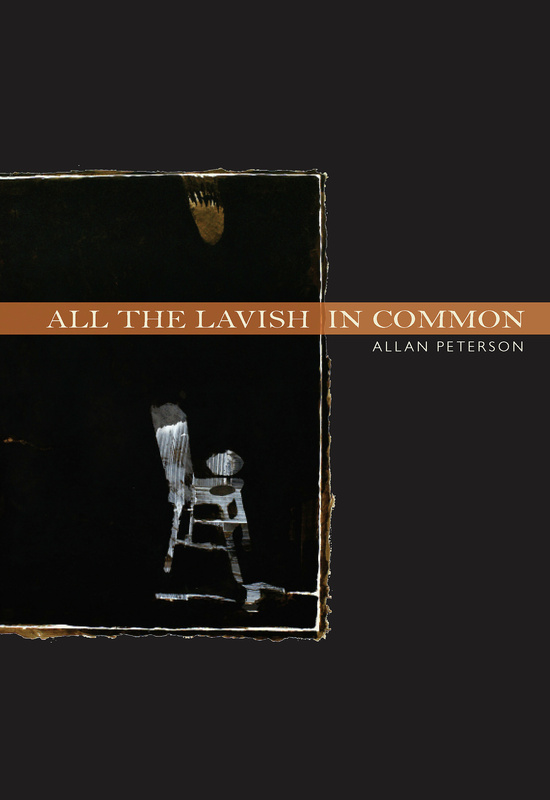These poems remind us that we are all in the thick of things, the rich and complicated givens. Moving fluently from subjects as diverse as the surface of Europa to a tiny spider in a tear of wallpaper, from Pythagoras at Tyre to the wings of a dragonfly, they are in love with the world and the deep seriousness of living. Often lavish themselves, they reflect that fact that the author is a visual artist as well as a poet of insightful and sustained imagination.
In All the Lavish in Common , Allan Peterson journeys into language and culture and deep into the hidden places within us, and he speaks from there. As he says in one poem, 'The real details are the unexpected / taking on new life.' With a combination of wisdom and humor, Peterson speaks 'tangibly / about the intangibles.' He gives us reason to be thankful these poems exist.'—Andrea Hollander Budy, author of The Other Life and House Without a Dreamer
'Say your dog could suddenly understand you. Why do men look at women the way they do? it'd ask. Why have y'all messed up the environment? And no heaven for dogs-now why's that? In Allan Peterson's beautiful new book, there's a poem on this subject but also many others: guilt, foolishness, death, hope, even our inability, after all these years, to predict the weather. In the dog poem, the good creature listens patiently but really just wants her master to throw the ball so she can bring it back to him. Patience and compassion are the hallmarks of Allan Peterson's poems; to read them is to be a better human being.'—David Kirby, author of The House of Blue Light and The Ha-Ha
'Each of Allan Peterson's poems is like a journey through the here and now; we have the feeling of moving even though we're not, and we always arrive somewhere new. Alert to the life that lies in the wren's whistle, no poem tells us where it will end up until it ends. Every object we encounter is a warehouse of the perceptual, with the invisible laboring right behind, and everything arrives full-sized. How likely the impossible is in these poems, and how beautiful. They will sing your bones alive.'—Reginald Shepherd, author of Otherhood and editor of
The Iowa Anthology of New American Poetries
'From out of left field, or rather north Florida, comes a smart and mature second collection. Peterson's sinuous lines and careful sentences imagine the perspective of dogs, 'The Need to Explain,' 'The Appeal of Antiques' and the melancholy fascinations of everyday life: 'the calf in the pasture/ that became a flowered purse.' Peterson tracks the vicissitudes, oddities, and noteworthy tangents of contemporary household with originality: he cares not just how things look or for how we fell, but for the ways in which our habits make us make mistakes about ourselves and about the people with whom we share our lives. A southern landscape and a midwestern childhood inform the poems; so does an interest in middle age. Yet biography lies under the crenellated surfaces of these poems, which gradually bring their topics into view, as readers learn to piece together Peterson's similes, cognitive leaps, odd ideas: 'Duration is like blood to time, the river in which it swims.' 'Often as moss I stare at my hands in amazement,' the poet confesses, 'at the what I'm made of'; readers who seek challenge might be amazed, too.'—Publishers Weekly
'All the Lavish in Common won the Juniper Prize for Allan Peterson, and deservedly so. These lavish poems make the most of language as they explore the rich and complicated givens of our lives, using a wide canvas for their splatter of diverse subjects.'—The Comstock Review
Allan Peterson recently retired as chair of the Visual Arts Department and director of the Visual Arts Gallery at Pensacola Junior College in Florida. His first book, Anonymous Or, won the 2001 Defined Providence Press competition.





